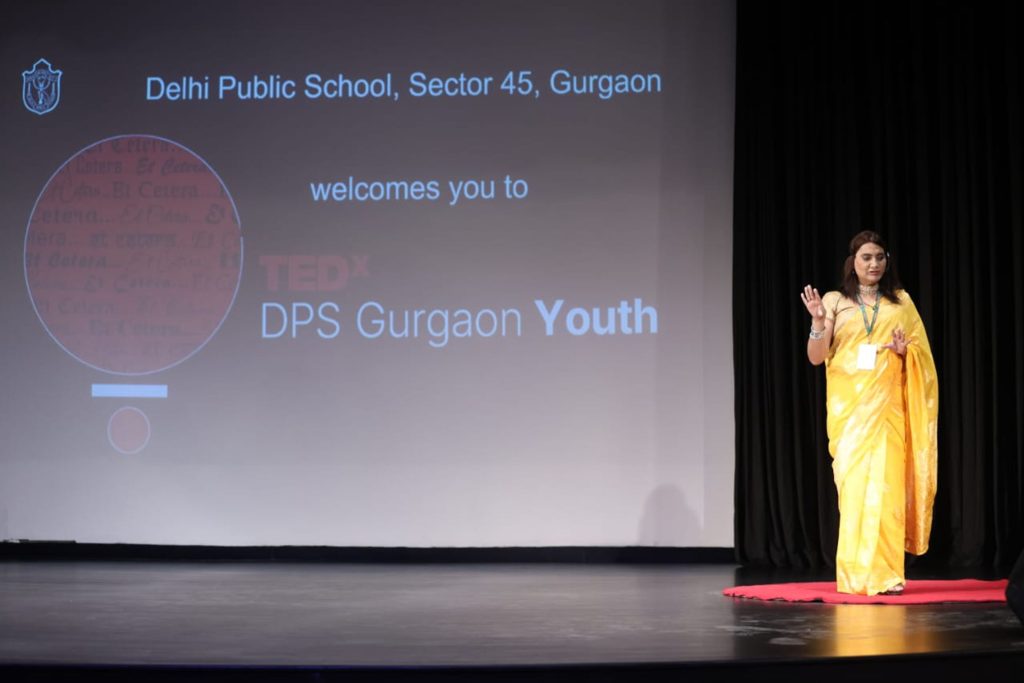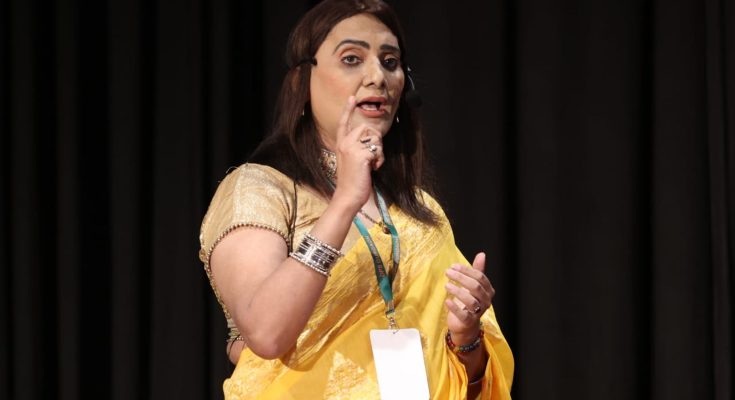This time meet Naaz Joshi, India’s First International Trans Beauty Queen, a relentless advocate for change. Her journey from shattering stereotypes to challenging healthcare and education disparities is a beacon of hope. In this interview, the three-time TEDx speaker, shares her vision for a more inclusive society and the future she envisions for actual transgender rights. An exclusive talk with the first trans woman to win the title of Miss World Diversity for five consecutive years!
Many transgender individuals in India have to grapple with limited access to healthcare and educational opportunities. How do you envision a more inclusive society that addresses these disparities?
Healthcare in India is either poor or very expensive, and yes educational opportunities are also very less, i wanted to pursue law from an eminent college in Greater Noida, they told me interview that don’t u think your presence will make uncomfortable to other students, and as for healthcare you know that we are banned to donate bloods, because health experts assume that because some might be carrying HIV virus as some of the transgender are involved in sexual work. Hey, that’s a wrong perception. Also, don’t you test the blood donated in general for HIV? So why the fuss, let us help save lives, right? You may not be aware that when a transgender approaches a hospital for medical care, many prescribe an HIV test. So, the healthcare system has to rise above all this gender bias.
On the beauty pageants front, everyone will remember Yukta Mookhey or Harnaaz Sandhu even years later, but will they remember or acknowledge Naaz Joshi with the same warmth and respect? Only Google so far is GENDER UNBIASED! It accepts me and others as who they are!
I am India’s First International Trans Beauty Queen but I am not getting the due respect, not even at restaurants or bars, who refuse to allow me an entry. Do I need to wave my award each time? Why is such a discrimination still prevalent in society if we are legal and the third gender in India? On the other hand, I do stand out as a motivational speaker at many schools and colleges who call me to teach children about acceptance and equality. So times are changing, but not at the desired pace. To be more inclusive we need to be accpepted in the society Mahima, otherwise how will we be heard? I may be heard to a little extent because I shattered the glass ceiling, but for others it is not the same case. And yes, we have to be more assertive about our rights too.
As a transgender beauty queen, you’ve likely broken barriers and challenged stereotypes. Can you share a specific moment when you felt your advocacy had a positive impact on someone’s life?
In recent times, there has been a noticeable shift towards greater inclusivity in beauty pageants, particularly in affording trans women more opportunities to participate. I personally achieved a significant milestone by winning my first International Cisgender Pageant in 2016. This change is emblematic of the progress we are making in embracing diversity and promoting equality.
As a parent, I am deeply committed to empowering my daughter by imparting valuable life lessons, notably the importance of standing up against any form of mistreatment or injustice. My goal is to instill a sense of resilience, self-respect, and the confidence to assert her rights.
I strive to be a positive influence not only within my family but also in the broader world. I firmly believe in speaking out against wrongdoing, whether it directly affects me or anyone else, whether it unfolds within my personal sphere or in the public domain. This commitment to advocating for what is right is rooted in a desire to create a better and more equitable society for all.
The world is becoming increasingly interconnected. How can India learn from and collaborate with other countries in addressing transgender issues, and what global best practices can be applied in India?
In our diverse country, we encounter varying perspectives from different segments of society. While the rural areas often hold us in high regard, viewing us with deep respect, urban areas sometimes misperceive our lifestyles as trends. This misperception stems from a perception that we are assimilating Western culture.
Our Indian government, composed largely of individuals from the previous generation, sometimes exhibits a lack of understanding and acceptance of the transgender community. This disconnect is evident in outdated beliefs that were once passed down to children, reinforcing stereotypes.
Just as there are retirement ages in various professions, there should be a consideration for a retirement age in politics. This could provide an opportunity for fresh perspectives and ideas to be injected into governance.
As an international pageant director and producer for Miss Universe’s Trans competition, I’ve observed that even in other countries, the government’s efforts in this regard can be lacking. However, my transgender contestants in India excel in a range of professions, from dog grooming and flight attending to successful businesses, fashion design, and modeling. They are highly respected in their fields, a status that is often not reflected in government support or policies.
While we may not have high expectations from the Indian government, we hope for increased recognition and inclusivity for the transgender community in the future.

Emerging technologies like AI and virtual reality are impacting various aspects of society. How do you envision these technologies being used to create more inclusive spaces for transgender individuals in India?
This question touches upon a significant aspect of the evolving social landscape in the context of digital platforms and inclusivity. After the emergence of platforms like TikTok and Instagram Reels, we have witnessed increased inclusivity, with transgender individuals gaining prominence as social media influencers. It’s a matter of pride and recognition for their contributions.
However, it’s important to acknowledge that not everyone can become a social media star. The primary aspiration of many transgender individuals is to find acceptance in offline settings, specifically in the form of job opportunities. The desire is for equality and inclusion within workplaces, without having to resort to professions like sex work or begging. The simple request is for equitable opportunities and fair treatment in traditional employment settings. Your empathy and support can serve as a source of strength for the transgender community.
On a related note, it’s noteworthy that you are organizing a trans international pageant and have garnered support from various countries, including a crown designer from Brazil, media support from the Philippines, and transgender surgery as an award from Thailand. However, when seeking support from individuals or entities in India, I’ve encountered challenges, including a radio channel requesting payment for their assistance, despite initially showing interest.
Such and many such situations raise a valid point. If we extend support to others through the media, it is reasonable to expect a reciprocal level of support. Such a balanced and equitable approach fosters a sense of cooperation and solidarity. In essence, my experiences highlight the importance of a mutual support system for the transgender community and the value of fair and dignified collaboration. So thank you for taking my views for The Think Pot, in a desired manner Mahima.
In your view, how might the beauty, cinema and fashion industry evolve to better represent and support transgender individuals in India, both on and off the runway?
The concern is primarily related to the representation and opportunities available to trans women within the film industry. It’s observed that such inclusion is often limited to on-screen roles of very short duration. We might consider broadening our approach by encouraging more significant involvement of trans women in other critical roles, such as spot girls, makeup artists, costume designers, and assistant directors.
At present, there are only a few notable examples of trans individuals making their mark in these fields, like Ojas Rajni in makeup artistry, Saisha Shinde in fashion design, and Gazal Dhaliwal as a story writer in Bollywood. The question arises as to why we can’t strive for greater representation in various capacities, allowing trans women to contribute more substantially to the industry. This expansion of opportunities could lead to a more diverse and inclusive film industry.
In a future where transgender rights and acceptance are more widespread, what role do you see yourself playing in advocating for the community, and what goals would you like to achieve?
The future holds significant promise for the advancement of transgender rights. While challenges persist, there is a determined and ongoing effort to bring about positive change. As someone who has been at the forefront of this struggle since the generation of Gen X, I continue to advocate for the rights of trans individuals.
My vision for the future encompasses greater inclusivity in trans marriages, enhanced support from parents for their transgender children, and the extension of adoption rights to the LGBTQ+ community. I see my role in this movement as that of a dedicated advocate, inspired by the adage, “Khoob ladi Mardani, wo to saundarya ki Rani thi,” which signifies the strength and resilience that characterize the pursuit of justice and equality.
In a society where transgender rights and acceptance still face significant challenges, Naaz Joshi’s story is a light of hope, resilience, and unwavering advocacy for a brighter and more inclusive future. So do ensure that you share this heart-warming interview which forces us all to think deeply as a society!
Images Courtesy: Naaz Joshi
Disclaimer: The opinions expressed in the above interview are the personal opinions of the protagonist/protagonists for which The Think Pot is not liable in any manner. To share your views on an apolitical and an intense subject like this you can reach out to us at mahimaasharma@thethinkpot.in

